Skilling reskilling upskilling fever raging countrywide
With the unrelenting march of automation and artificial intelligence, a spectre of unemployment and redundancy is haunting executive suites as much as college campuses. Therefore a fever to skill, reskill and upskill is pervading middle class India, if not less aware segments of the population writes Summiya Yasmeen
After the Covid pandemic that swept the nation and took an officially estimated 533,570 lives (perhaps 10x the number, according to informed unofficial estimates), a new contagion is spreading countrywide: fear and loathing of unemployment and redundancy. With the unrelenting march of automation and artificial intelligence, a spectre of unemployment and redundancy is haunting executive suites as much as college campuses. Therefore a fever to skill, reskill and upskill is pervading middle class India, if not less aware segments of the population.
With the ruling BJP/NDA government at the Centre and particularly BJP which has enjoyed a majority in Parliament for over a decade, receiving a shellacking from the electorate — its absolute majority in the 543-seats Lok Sabha was reduced from 303 to 240 in the recently (June) concluded General Election 2024 to a great extent on the issue of rising youth unemployment — in the Union Budget 2024-25 presented to Parliament on July 23, Union finance minister Nirmala Sitharaman has given top billing to employment and skilling the country’s children and youth.
“The Union Budget 2024-25 focus is on employment, skilling, MSMEs and the middle class…. This year, I have made a provision for Rs.1.48 lakh crore for education, employment and skilling,” said Sitharaman. In her 145-minute budget speech, she announced several skills education initiatives to skill 41 million youth over the next five years; model skills loan schemes of up to Rs.7 lakh to 25,000 students per year; upgradation of 1,000 Industrial Training Institutes (ITIs) and an internship scheme for 10 million youth in 500 top companies. (see box p.53).
This sudden awareness within the BJP leadership which hasn’t been serious about according high priority to public education — with the exception of Prakash Javadekar, all Union education ministers including incumbent Dharmendra Pradhan have been insular autocrats with no accountability to the media or public — has pleasantly surprised informed monitors of the neglected education sector.
“Although a separate Union ministry of skill development was established in 2014 and ambitious targets were set by the Central and state governments, actual results on the ground remain far from set targets. While Budget 2024-25 has announced some significant skills education schemes, the government needs to do more to strengthen implementation of skilling programmes and the skill ecosystem in the country,” says Ajay Khanna, chairman of the Committee on Skill Development of PHD Chamber of Commerce & Industry (estb.1905), a Delhi-based industry promotion and advocacy organisation.
Although opposition parties in Parliament especially Rahul Gandhi, leader of the Congress party which has ruled at the Centre and in most states for over half century, seem oblivious, skills education aka vocational education and training (VET) and foundational literacy and primary education, have been foolishly neglected by successive administrations at the Centre, and the Congress party in particular. Since India won its freedom from foreign rule in 1947, national (Centre plus states) annual expenditure on education has never exceeded 4 percent of GDP against the global average of 5 percent and 6-10 percent of GDP in developed OECD countries.
Consequently, India’s chronically under-funded 1.20 million public/government schools defined by crumbling buildings, conspicuous deprivation of labs, libraries and lavatories, are in a shambles. The Annual Status of Education Report (ASER) of the independent and globally respected Pratham Education Foundation highlights that the majority of teenage students of public/government schools cannot read class II textbooks in any language or solve basic arithmetic sums. Neither, despite Mahatma Gandhi’s advice, was VET introduced in government schools.
Resultantly seven decades later, the Indian economy offers a curious paradox. It is saddled with a large and rising number of unemployed youth and a shortage of sufficiently literate, numerate and skilled employees required by industry. According to TeamLease Services Ltd, the country’s premier white and blue-collar personnel staffing company, a mere 4.69 percent of the total workforce (560 million) in India is formally trained. The government’s latest Economic Survey 2023-24 estimates that a mere 4.4 percent of the workforce countrywide is formally skilled with 16.6 percent skilled informally. More shockingly, this official pre-budget survey acknowledges that 48.75 percent i.e, one of two college/university graduates is unsuitable for employment in government or industry.
Against this backdrop, it’s hardly surprising that disruptive automation, machine learning, green energy and artificial intelligence are generating panic. Managements of large and medium-scale enterprises especially IT behemoths are investing huge amounts for training new recruits (Indian IT firms spend an average Rs.1.97 crore to train employees every year) and signing up their most promising employees for company-paid upskilling programmes to improve workplace productivity and competitiveness.
According to Skilling Today, a global report released by talent mobility provider Randstad RiseSmart, in 2020, Indian companies led corporates worldwide in providing skills training programmes to their employees. An estimated 77 percent of companies surveyed in India said “they implemented programmes for employees to either upskill or reskill themselves to meet changing business needs” (cf. global average of 68 percent).
Fear of obsolescence, being sidelined and/or pink-slipped, in a rapidly changing jobs marketplace is driving a rising number of working professionals to voluntarily sign up for upskilling programmes to remain contemporary and acquire additional skills. A 2023 report of Internshala, a Gurugram-based edtech offering students internships and online skill training programmes, reveals a remarkable 6.3-fold increase over the five years past in the number of students opting for online certification courses to enhance their skillsets. The most sought after upskilling courses are web development, data science, machine learning and AI.
Similarly, Great Learning, a Bengaluru-based edtech company, predicts that eight of ten Indian professionals in the manufacturing, engineering and capital goods sectors are planning to invest in upskilling programmes in 2025.
“Within industry and among working professionals and students, the new mantra is skill, reskill and upskill to secure promotions and best jobs. There’s new awareness that the best jobs and corporate promotions are heavily dependent on skills competence and training. Our TeamLease survey showed that in the pandemic year 2020, almost 87 percent of working professionals invested in self-learning and upskilling. And this was not restricted to IT employees but also shopfloor workers in industry. This is a very beneficial development as it promises a productivity surge in India Inc,” says Neeti Sharma, CEO of TeamLease Digital Pvt. Ltd (estb. 2000), an IT industry placements company and subsidiary of TeamLease Services Ltd, the country’s premier personnel placements company which provides skilled technicians including accountants, data entry/back office, BPO/customer care, front office/receptionists, hospitality managers, chefs, chauffeurs etc to industry. Moreover to shape and prepare personnel and informally skilled individuals, the company has promoted TeamLease University, Vadodara (TLU, estb.2013), billed as India’s first specialist skills university.
Promoted as a PPP (public-private partnership) enterprise with the Gujarat state government, TLU offers over 100 ‘work integrated learning’ programmes of six months to three years duration in mechanotrics, hospitality and tourism, information technology, and health, life and applied sciences, among other vocations.
 Over the decade past, TLU has certified over 400,000 personnel. Ab initio in 2014, the university launched an apprenticeship programme with the Union ministry of skill development and entrepreneurship (MSDE) — the TeamLease Degree Apprenticeship (TLDA). Under this programme apprentices are placed in companies for periods ranging from three-36 months and paid stipends of Rs.13,000-15,000 per month, earning-while-learning. Since then, TLU claims to have placed 1 million apprentices in over 150 job roles in sectors such as hospitality, education, healthcare, pharmaceuticals, manufacturing, retail, construction, logistics, automotive, etc, under the TLDA programme with a transition rate of 98 percent into formal employment.
Over the decade past, TLU has certified over 400,000 personnel. Ab initio in 2014, the university launched an apprenticeship programme with the Union ministry of skill development and entrepreneurship (MSDE) — the TeamLease Degree Apprenticeship (TLDA). Under this programme apprentices are placed in companies for periods ranging from three-36 months and paid stipends of Rs.13,000-15,000 per month, earning-while-learning. Since then, TLU claims to have placed 1 million apprentices in over 150 job roles in sectors such as hospitality, education, healthcare, pharmaceuticals, manufacturing, retail, construction, logistics, automotive, etc, under the TLDA programme with a transition rate of 98 percent into formal employment.
Perhaps taking a cue from the TLU-Gujarat government skills development model, several state governments and progressive edupreneurs have promoted higher education skilling institutions. Among them: Vishwakarma Skills University, Palwal (Haryana, estb.2016); Delhi Skill and Entrepreneurship University (2020); Assam Skill University (2021); Kaushalya Skill University, Gujarat (2021); state government-run Maharashtra State Skills University (2022); Seacom Skills University, West Bengal (2014); Medhavi Skills University, Sikkim (2021) and the private sector Lamrin Tech Skill University, Punjab (2022).
Arguably the most promising of the new crop of skilling institutions, which if they are successful could spark a great and much needed productivity leap in India Inc, is the privately promoted SCOPE Global Skills University, Bhopal (SGSU) of the AISECT Group. AISECT owns and/or manages five skills-focused universities including CV Raman University in Bilaspur (Chhattisgarh); Rabindranath Tagore University, Bhopal; AISECT University, Hazaribagh (Jharkhand); Dr. C.V. Raman University, Vaishali (Bihar) and Dr. C.V. Raman University in Khandwa (Madhya Pradesh).
Established in 1985 by NIT-Bhopal alum and skilling evangelist Santosh Kumar Choubey, the AISECT (All India Society for Electronics & Computer Technology) Group has also partnered with the Central government’s National Skill Development Corporation (NSDC) and set a target to dispense skills-based training to 2 million youth by 2029. Under this partnership, AISECT provides short-term certificate and diploma programmes in ‘focused trades’ including computer hardware maintenance, hardware and networking, livelihood & vocational training, banking, financial services & insurance, agriculture, teacher training, marketing & retail, apparel & textiles, tourism & hospitality, telecom, beauty & wellness and construction.
“There’s huge and rising demand for professionally delivered skills education. While AISECT universities have always focused on providing industry-oriented degree programmes with skilling courses as electives and short-term diploma programmes, we discerned a need for a specialist skills university to meet the demand for industry-aligned education and training. Therefore, last year we promoted the SCOPE Global Skills University as India’s first higher education institution aligned with NEP 2020 and the National Skills Qualification Framework goals. SGSU’s mission is to bridge the academia-industry gap through curriculums designed in close co-operation with industry, flexible work-integrated degree programmes and incubation support to start-ups. We have already designed and introduced several degree programmes anchored by well-reputed industry partners. For instance, our B.Tech data science degree programme is designed in partnership with IBM; BBA in hospitality and restaurant management with the National Restaurants Association of India and two diploma programmes in automobile engineering in collaboration with Hero Motors and Hyundai,” says Siddharth Chaturvedi, Director of the AISECT Group and Chancellor of SGSU. Spread across a state-of-the-art 25-acre campus in Bhopal, SGSU has signed up 800 students within ten months.
Another pioneer skills development-focused private higher education institution is Centurion University, Bhubaneswar (estb.2010) promoted by visionary educationist Dr. Mukti Kant Mishra. Centurion offers its students traditional three/four-year degree programmes with the option to sign up for several skill-based courses as electives. Moreover, it also runs a full-fledged School of Vocational Training providing short-term certificate and diploma programmes in several trades and vocations in its learning centres in Odisha, Andhra Pradesh and Assam.
A major contributory factor boosting skills education countrywide is the revamp and restructuring of NSDC, which is pulling out all stops to disseminate NSDC-certified skilling programmes in partnership with properly vetted higher education institutions.
Promoted in 2008 as a joint Central government and India Inc enterprise, NSDC was plagued by several scams and scandals in awarding training partner licences to private firms. But in 2014, after establishment of the Union ministry of skill development & entrepreneurship by the BJP government and launch of the Skill India Mission in 2015, NSDC was brought under the new ministry’s purview and revamped. Since then, it has signed up 58,914 reputed private training partner firms and HEIs (including TeamLease, Centurion, AISECT, etc). Its 38 Sector Skill Councils set standards in consultation with industry and draw up curriculums for vocations. According to NSDC these partnerships have trained 34 million youth for 11,912 job roles.
The restructuring and rejuvenation of NSDC has enthused several blue-chip corporates to sign up with the corporation to upskill freshers and gig employees. For instance in December 2022, the Gurgaon-based Urban Company (UC, estb.2014), which bills itself as Asia’s largest marketplace for home services (through its mobile app and website) including beauty, carpet cleaning, plumbing, carpentry, appliances repair, house painting, etc, signed a “long-term partnership” agreement with NSDC to train and certify the company’s 57,000 ‘partners’. Under the agreement, service professionals (carpenters, plumbers, electricians, beauticians, home appliances repair technicians etc) registered with UC undergo skills training of various durations after which they are awarded UC-NSDC co-branded certification.
“Soon after starting our business, we realised that many service professionals registering with us had hands-on experience, but no formal training in their trades. Therefore, when we signed them up as partners, we simultaneously began training them. Our partnership with NSDC formalises their training and enables thousands of unskilled self-employed service providers to become government (NSDC)-certified skilled professionals. Currently, our 200 trainers conduct three-15 day training programmes for all UC partners towards which we have spent Rs.500 crore. Obviously we believe that formal skilling and training of our partners is necessary for them to offer excellent service to our customers. For our partners, the benefit is that they are transformed into well-remunerated, certified organised sector micro-entrepreneurs. According to our UC Earnings Index, the average monthly net earnings of our partners delivering over 30 services is Rs.33,469, a clear indicator that formal training improves earnings. Our target is to skill 2.5 lakh UC partner professionals by 2030,” says Bhavya Sharma, director of corporate communications & ESG (environmental, social and governance) at UC, which claims to provide home services to 10 million customers.
Rising demand from blue-collar workers to executives for upskilling has birthed a new genre of edtech companies providing skills programmes in a wide arrary of disciplines from AI to business networking. According to industry reports, professionals are signing up in droves with online skills training providers such as Upgrad, Unacademy, Emeritus, Great Learning, Hero Vired, Scalers, among others. These edtech companies have themselves tied up with top-ranked higher ed institutions and B-schools to provide business management plus new-age skilling programmes such as generative AI, machine learning, data analytics, leadership, of few weeks to three years duration.
Uplifters Academy, Gurugram (estb.2023) is one such “skills-based edtech startup” specifically targeting college students and entrepreneurs in tier-2 and tier-3 cities. Promoted by Umang Sangal (29), an alum of NIT, Allahabad, the objective of Uplifters is to deliver skilling programmes in new-age IT technologies to pre and final year undergrads and working professionals to enable them to become job-ready and progress up the executive ladder. Since it was promoted 18 months ago, the company has signed up 2,500 students for its online weekend, pay after placement and placement assistance programmes, campus workshops, summer internship programs and virtual masterclasses.
“Our goal is to support and enhance India’s under-prepared and undervalued youth by upskilling them to compete with their counterparts worldwide. Currently, we offer upskilling courses in data science, software development and digital marketing for which there is maximum demand. Our distinguishing feature is that we teach in ‘Hinglish’, a combination of Hindi and English which our students from small towns and cities prefer. Moreover, our fees are affordable with several flexible payment options,” says Sangal. Tuition fees per student for four-seven month skilling courses range between Rs.5,000-20,000.
The swelling rush for upskilling courses is not confined to the manufacturing, services, IT and new tech industries. It has also spread to the biotech, life sciences, health and medical sectors. Several edtech startups have blossomed to specifically skill students/professionals for these fast-track sectors of the economy.
A case in point is SHRM (Hindi for ‘hard-work’) Biotechnologies Pvt. Ltd (estb.2006), a Kolkata-based training and skills development company that offers students — undergrads to doctorate scholars — short-term upskilling programmes in biotechnology, pharmacy and life sciences, and provides research, incubation and placement assistance. Accredited by the Life Sciences Sector Skill Development Council of NSDC, SHRM has skilled and certified over 12,000 students enrolled in the company’s online and offline programmes.
“There’s rising demand from India’s booming biotech industry for skilled professionals. Our objective is to prepare and skill students for this sunrise industry by bridging the academia-industry gap. Our upskilling programmes are industry-driven and responsive to changing market needs with students provided hands-on industry experience in our two modern research and development lab facilities in Kolkata. Experiential learning is the mantra for all students to become employable, and for professionals to progress in their careers,” says Kunal Vora, founder-director & CEO of SHRM Biotechnologies.
Yet perhaps the best news is that awareness of the importance of skills acquisition is spreading within India’s huge and low productivity agriculture sector. Although rural India hosts 60 percent of India’s 1.4 billion population, it contributes a mere 15 percent of annual GDP. Handicapped by rock-bottom foundational and primary education provided by 1.20 million state government schools, India’s farmers use antiquated tools, equipment and farming know-how.
Established in 2013, the Agriculture Skill Council of India (ASCI), under the jurisdiction of the Union skill development ministry, is tasked with “bridging gaps and upgrading skills of farmers, wage workers, self-employed and extension workers engaged in organised/unorganised segments of agriculture & allied sectors” at a time when “the country’s agriculture sector is experiencing stagnant growth and exodus of quality manpower to other sectors”. Since then, ASCI has developed 176 ‘Qualification Packs’ in farm mechanisation and precision farming, agri information, soil health, poultry management, etc and has signed up 736 training partner organisations including 68 agricultural universities and private institutes and companies. They have collectively trained 1.3 million youth, a minuscule number but a good beginning.
Since it was voted to power at the Centre in 2014, again in 2019, and now for a third term in 2024, the BJP-led NDA government has accorded commendable attention to vocational and skills education. For one, the broadly titled Union ministry of human resource development has been appropriately narrowed down to the Union ministry of education, and a new ministry for skill development and entrepreneurship was established in 2014. Since then, it has launched several officially-sponsored skills development programmes including the flagship Skill India Mission. According to Union finance minister Nirmala Sitharaman, the mission has skilled 14 million youth since its launch in 2015 (see box p.54). The government’s showpiece National Education Policy (NEP) 2020 also accords high priority to skills education mandating “integration of vocational education into school and higher education institutions in a phased manner over the next decade”.
Yet the Modi administration and state governments have repeatedly failed to back up lip service to education including skilling, with larger financial outlays. Annual national expenditure for education (Centre plus states) is stuck in the 2.5-3 percent of GDP groove despite repeated promises in BJP election manifestos to raise it to 6 percent of GDP (as recommended by the Kothari Commission way back in 1967). Consequently, the number of VET institutes in India at 15,000 has remained static cf. 500,000 in China.
Therefore even official skills development initiatives are heavily dependent upon collaboration and partnerships with for-profit private sector enterprises. There is minimal awareness in government that skilling is the “super-structure” built on the foundation of strong primary-secondary education (see Special Report p.68).
“India is moving in the right direction in terms of government policies and schemes to skill and upskill its youth and workforce. However implementation of new initiatives is too slow. Government needs to press the implementation pedal and invest in creating a robust grassroots primary and vocational education system to achieve its ambitious skilling targets. Moreover, private industry and business need to do more to engage with schools, colleges and universities, starting from getting involved in curriculum-setting to providing practical internships and apprenticeships. NEP 2020 recommends a national mindset change through full integration of vocational training into mainstream education. This breaking down of barriers between vocational and academic education is imperative for India achieving its $30 trillion economy and Viksit Bharat targets by 2047,” says Neeti Sharma of TeamLease Skills University.
Although the BJP/NDA 3.0 government’s belated awareness — testified by several youth skilling initiatives contained in Union Budget 2024-25 — is in the right direction, it’s important to stress that robust foundational and primary-secondary public learning is a necessary precondition of delivering acceptable quality skills education for the country’s youth. To view academic and skills development education in separate compartments as the Union Budget 2024-25 does, is ill-advised. Therefore to adequately skill the world’s largest youth population, the BJP/NDA 3.0 and succeeding governments have no option but to ideate resource mobilisation and deployment strategies to more than double the national expenditure for public education from the current 2.7 percent of GDP to 7 percent. Failing this, it’s panicky initiatives to quickly skill 41 million youth in the next five years are likely to have little impact.
Over seven decades ago, Mahatma Gandhi, who masterminded India’s freedom from foreign rule, presciently observed that for children to mature into good productive citizens, they should be simultaneously provided education of the head, heart and hands. Like much else, this advice was ignored. The outcome is a low productivity nation, a laggard in the global development race.
Union Budget 2024-25: Skilling schemes
In her seventh consecutive Union Budget presented to Parliament on July 23, Union finance minister Nirmala Sitharaman identified ‘skilling and employment’ as one of the Top 9 priorities of the BJP-led NDA 3.0 coalition government. Allocating Rs.1.48 lakh crore for ‘education, employment and skilling’ in Union Budget 2024-25, she announced several Central government-sponsored skilling schemes and initiatives. Among them:
- Upgradation of 1,000 Industrial Training Institutes (ITIs) using the hub-and-spoke model with outcome orientation.
- New centrally-sponsored skilling scheme under the Prime Minister’s package for skilling and collaboration with state governments and industry. 2 million students to be skilled over five years.
- Course content & design of all skilling courses to be aligned as per needs of industry.
- Model skill loan scheme to be revised to facilitate loans of up to Rs.7.5 lakh with a guarantee from a government-promoted fund. Provided for 25,000 students per year.
- Internship scheme for 10 million youth in 500 top companies in India over five years. Interns will receive allowance of Rs.5,000 per month plus a one-time assistance of Rs.6,000. Central government to pay 90 percent of internship allowance with companies paying for training and 10 percent of internship amount from their CSR funds.
Government skilling schemes: A Progress Report
The Union ministry of skill development and entrepreneurship (MSDE) was established in May 2014 by the BJP government, soon after it won a decisive mandate in the General Election, to co-ordinate “all skill development efforts across the country” and achieve the vision of a ‘Skilled India’. Since then, MSDE has initiated several skilling programmes under its Skill India Mission. The latest Economic Survey 2023-24, released on July 22, provides a progress report of government skilling schemes:
Pradhan Mantri Kaushal Vikas Yojana (PMKVY, free short-duration skill training and certification). Since the scheme’s inception in 2015, 14.2 million persons have been trained, and 11.3 million certified under its Short-Term Training, Special Projects and Recognition of Prior Learning components.
Other initiatives launched under PMKVY include compulsory inclusion of on-the-job training in short-term training courses; 1,000 educational institutions nationwide onboarded as Skill India Centres and 119 new age and future skill courses introduced for eight sectors.
Craftsmen Training Scheme at Industrial Training Institutes (ITIs). Vocational training has been delivered to 1.24 lakh people through 14,955 ITIs.
Jan Shikshan Sansthan (JSS). This programme has been introduced for skilling non/neo literates and persons with rudimentary education. During the period 2019-2024, 2.6 million individuals have been trained, and 2.4 million certified.
National Apprenticeship Promotion Scheme (NAPS). Since it was launched in 2017, 3.2 million apprentices have been placed in 2.21 lakh establishments. Under the scheme, government reimburses 25 percent of the stipend (up to Rs.1,500) directly to the bank accounts of apprentices.
Entrepreneurship training. The National Institute for Entrepreneurship and Small Business Development provided training to 3.21 lakh individuals during the period 2019-24. Simultaneously the Indian Institute of Entrepreneurship, Guwahati, provided training to 1.43 lakh people.
Skill India Digital Hub platform. Launched in August 2023, this digital platform integrates all government skilling schemes and provides access to 690 online courses, 1,650 e-books, eShram/EPFO/NCS, Udyam, DigiLocker, GatiShakti, UMANG, AgriStack, PLI Schemes, ODOP, etc. Thus far 6 million students have registered.
New-age and future skills. The National Council for Vocational Education & Training (NCVET) has approved 200 new-age and future skill courses. In collaboration with Delhi University, it offers 100 new-age skill courses and 23 with ITIs.
Skill India International Centres (SIIC). Union Budget 2023-24 announced the launch of 30 SIICs. Of them, two centres at Varanasi and Bhubaneswar have become operational with another seven centres to come up soon.
NSDC International Limited. Promoted in 2021 for “ethical and transparent” international placement of skilled Indians abroad, it has placed over 26,000 Indian candidates in priority sectors such as information technology, construction in several countries.
PM Vishwakarma programme. Launched in September 2023 for recognition, skill upgradation, collateral free credit and marketing support to traditional artisans/craftspersons, the programme skills and supports 18 trades including tailors, barbers, masons, carpenters, blacksmiths, basket weavers, potters, etc. Currently, 1,533 centres in 25 states/UTs are providing five-15 days training with a stipend of Rs.500 per day. As on May 27, 21 million applications have been received, and 4.37 lakh individuals trained.
Source: The Economic Survey 2023-24





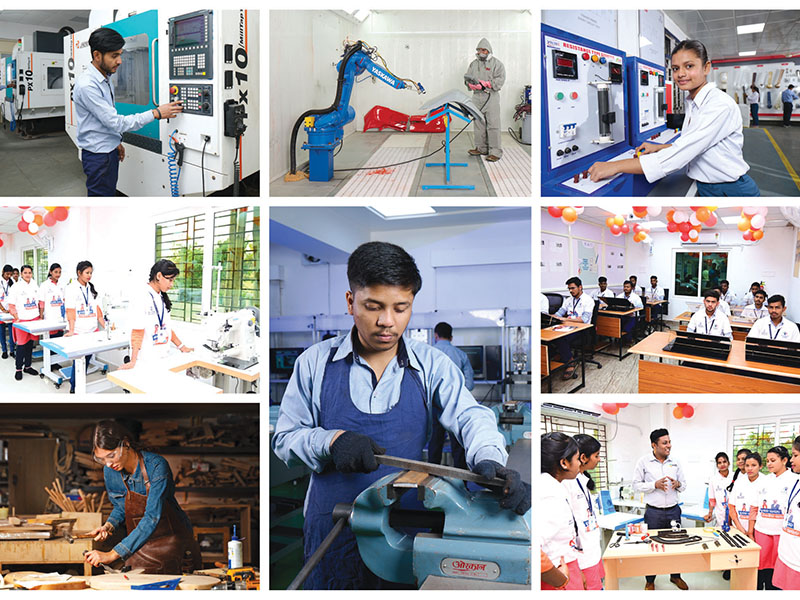
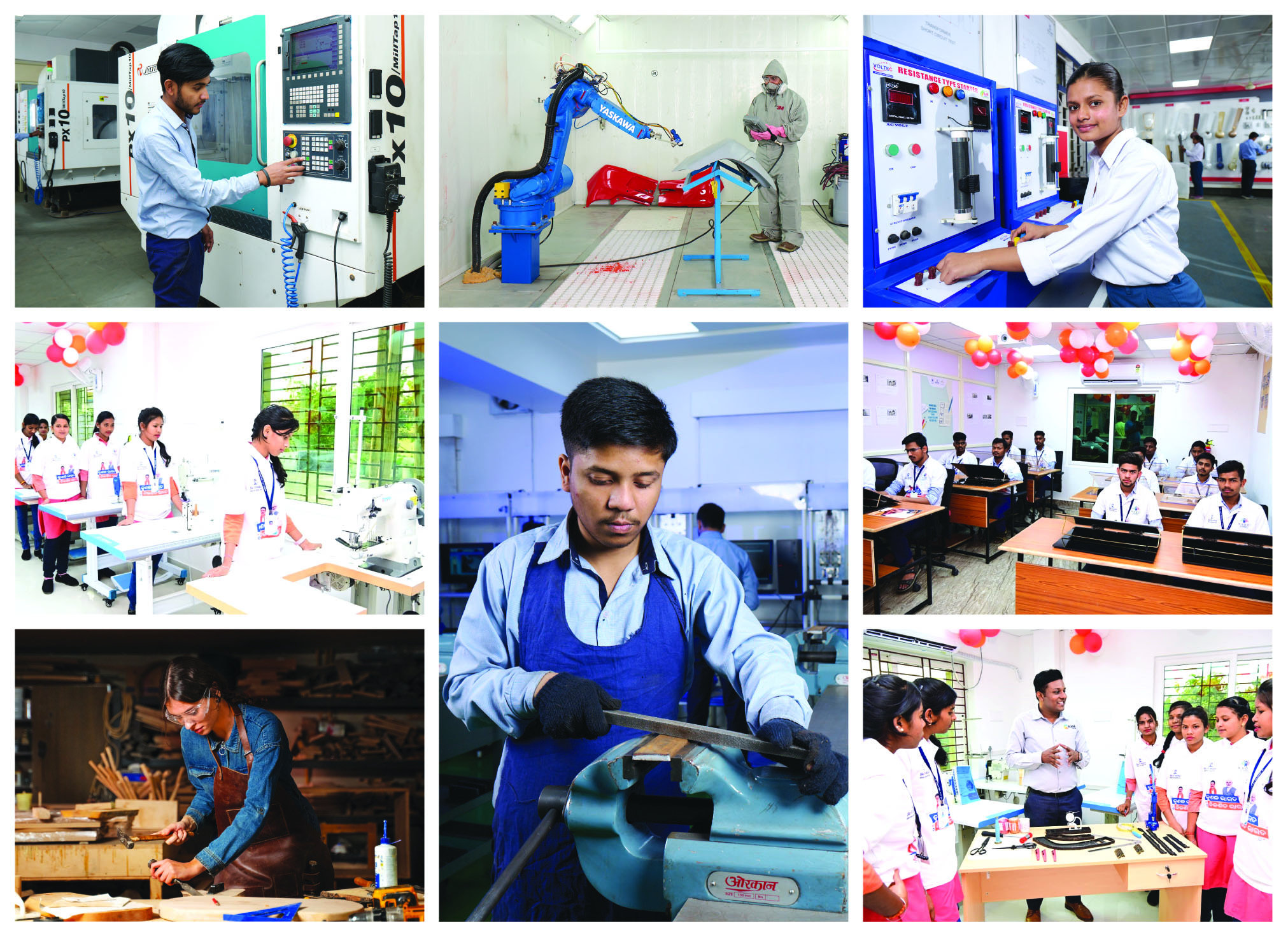
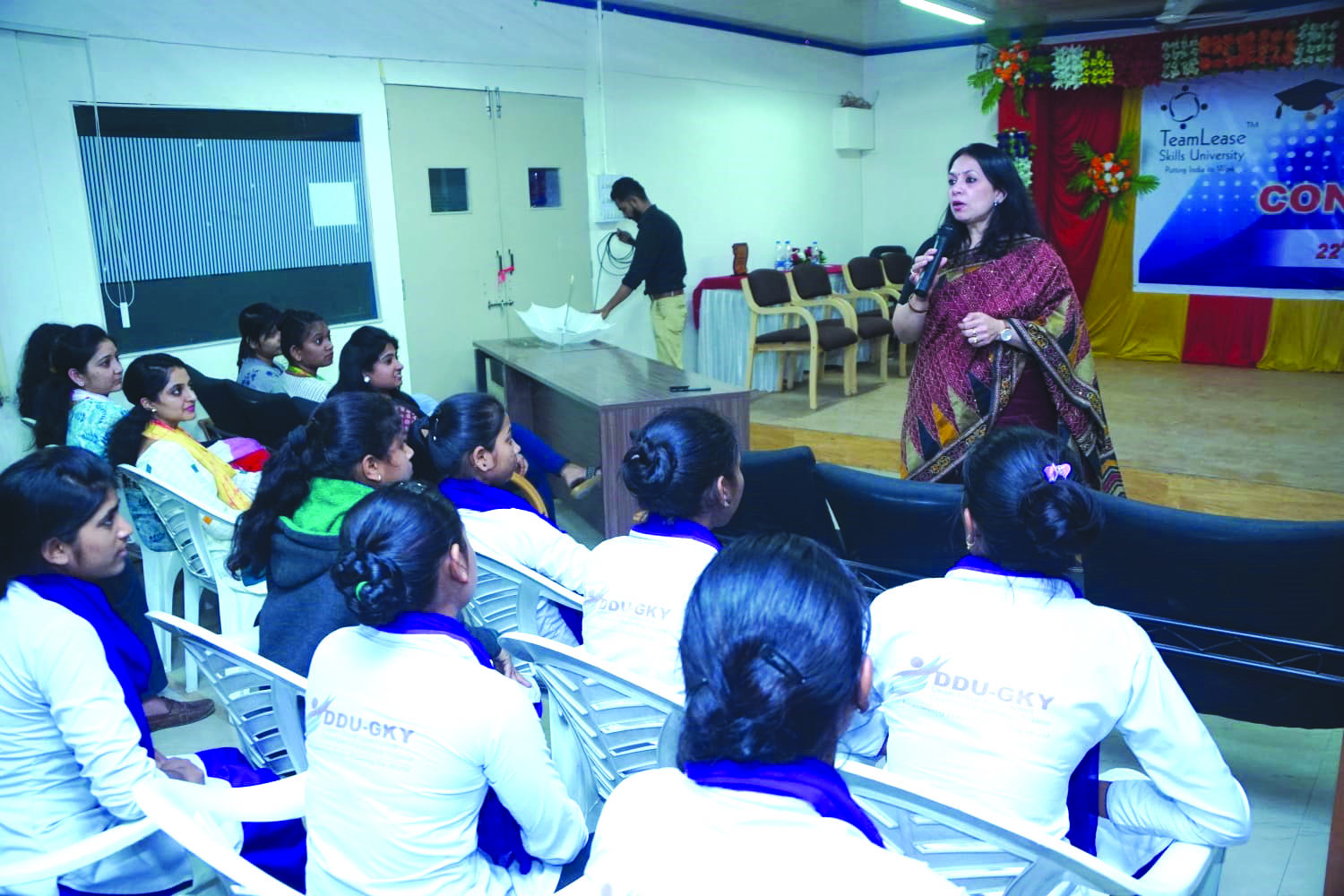
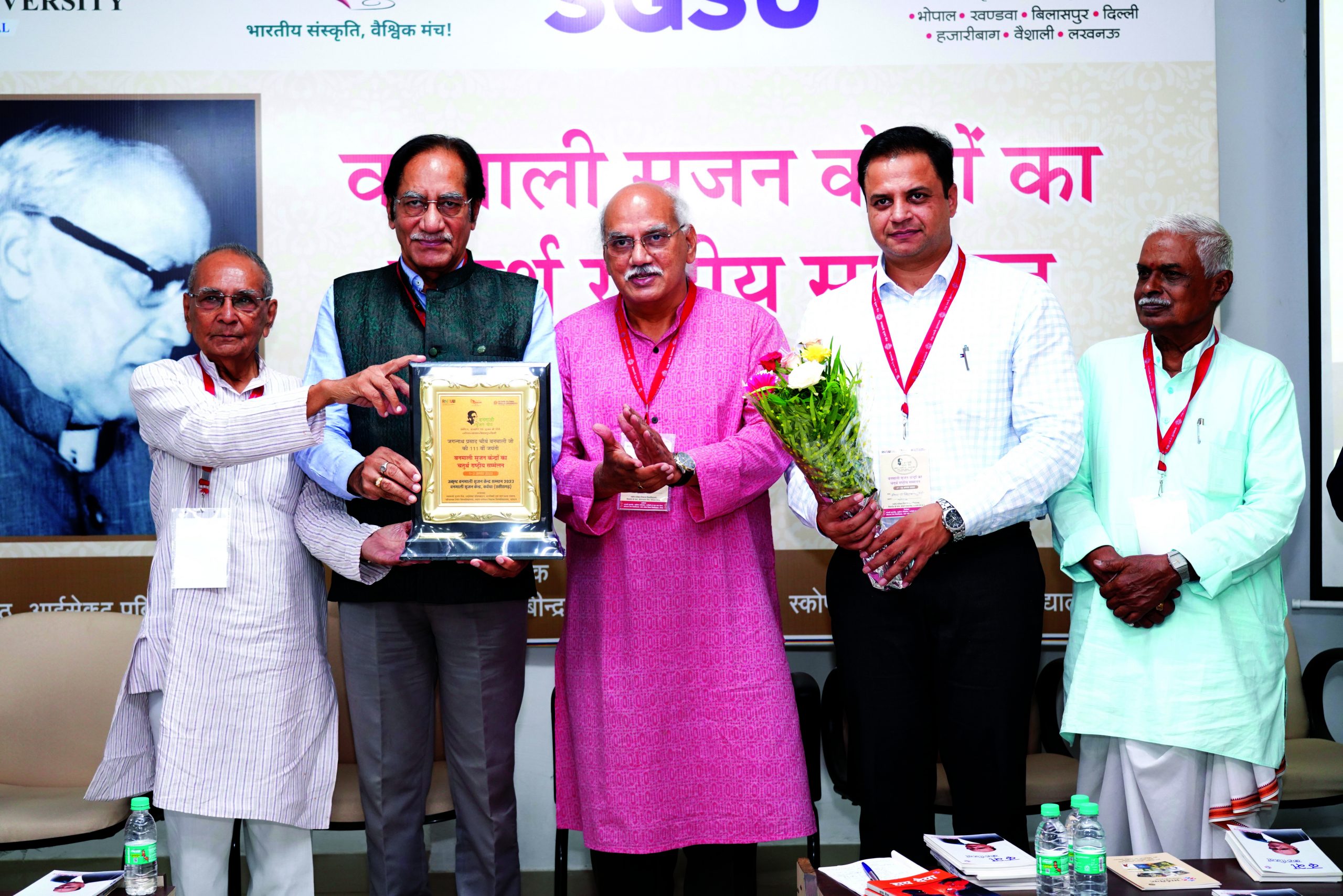

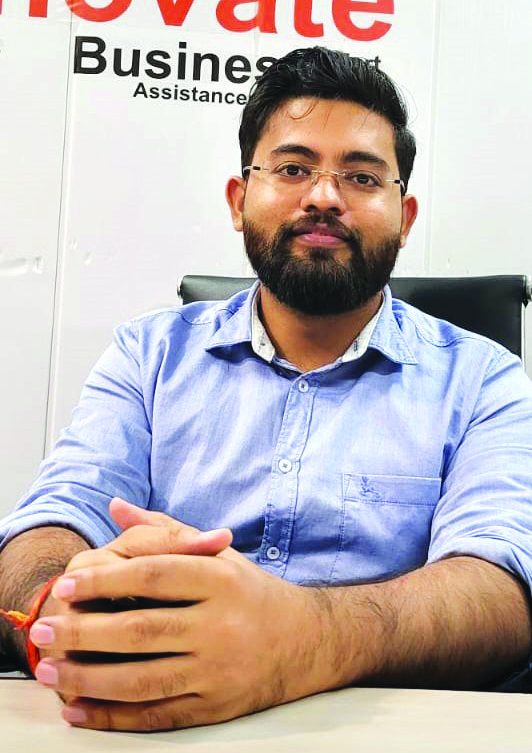













Add comment